|
September 7, 2017
Nova Scotia
Government Proclaims Bill 148,
Public Services Sustainability (2015) Act
- Interview, Jason MacLean, President of
the Nova Scotia Government
and General Employees Union -
PDF

Protest outside Nova Scotia legislature, December 2015 when Bill 148
was passed.
Nova
Scotia
• Government Proclaims Bill 148, Public
Services Sustainability (2015) Act
- Interview, Jason MacLean, President of the Nova Scotia Government
and General Employees Union
Quebec
• Paramedics on Strike
• Tentative Agreement for Montreal Pre-Hospital
Sector Workers
Salaberry-de-Valleyfield
• Adopt a Striker at CEZinc
British Columbia
Support the Pacific Blue
Cross Workers!
• "My Integrity Can't Be Bought!"-- Locked Out
Pacific Blue Cross Worker - Anne Jamieson
• The Use of "Essential Services" and
"Consultants" to Break Strikes
• Defending the Benefits of Pacific Blue Cross
Retirees Is Defending
the Rights of All
• Blue Cross/Blue Shield Restructuring in the
U.S.: A Hint of Things to Come?
Nova Scotia
Government Proclaims Bill 148,
Public Services Sustainability (2015) Act
- Interview, Jason MacLean, President of
the Nova Scotia Government and
General Employees Union -
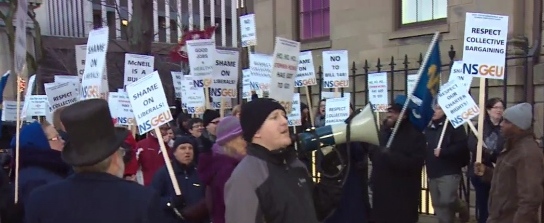
Picket outside Nova Scotia legislature, December 2015 against passage
of Bill 148.
On August 22, the majority Liberal government of
Nova Scotia proclaimed Bill 148, the Public Services
Sustainability (2015) Act which is a major attack on the public
sector workers of Nova Scotia and their right to negotiate their
working conditions, namely their right to negotiate wages that are
acceptable to them.
The Bill was actually adopted in December 2015 but was never
proclaimed as it served as a sword of Damocles over the heads of the
public sector workers to get them to "voluntarily agree" to anti-labour
and anti-public services concessions they would never have agreed with
if the process of negotiations adhered to the process of "free and
fair" negotiations without the over interference of the state on
behalf of private interests. This government
of Stephen McNeil is the same government that brutally violated the
right of the Nova Scotia teachers to negotiate their working conditions
by imposing a concessionary contract on them through the adoption of
Bill 75 in February of this year.
Posted below is an interview with Jason MacLean, the
President of the Nova Scotia Government and General Employees Union
(NSGEU). The NSGEU just launched a court challenge to have
Bill 148 declared unconstitutional and in contravention to the Charter
of
Rights
and
Freedoms
***
Workers' Forum: What are the main
features of Bill 148 that the Nova Scotia government just
proclaimed?
Jason MacLean: There are two main
issues with Bill 148. One of them is that it sets a wage
restraint, which the government calls a wage pattern. The bill freezes
wage rates for a two year period from the expiry of the collective
agreement and restrains increases in wage rates for the remaining two
years at 1 per cent in
the third year, and 1.5 per cent in the fourth year, with an
additional 0.5 per cent on the last day of the fourth year.
The other part of this bill reaches into our collective
agreement, tearing out a long-standing provision which is called the
Public Service Award. The Public Service Award is a deferred wage that
was actually bargained back in 1974. When we were bargaining, in
lieu of getting a raise, we worked out this provision according to
which
somebody, upon retirement, receives one week's pay for each year of
service up to 26 years of service. Then is it capped off, it does
not continue anymore. You get this amount upon retirement. You do not
get it if you leave and go to another job.
So, one aspect is the wages and the other aspect is the
removal of a provision in the collective agreement, an actual article.
WF: What is your main argument in
terms of your court challenge of the Bill?
JM: We feel that it infringes on
Section 2 of the Charter of Rights and Freedoms which is
about freedom of association and freedom of assembly. We feel that this
bill is punitive as it severely hampers the ability of the unions to
bargain. The bill applies to all public sectors in Nova Scotia which
means
around 75,000 workers and 8,000 of them are civil servants
that we represent. Our Civil Service component is currently in
negotiation and on its way to arbitration. There are going to be
arguments that are going to be made in arbitration that are going to be
affected by that bill. At least 80 per cent of these 75,000
workers
have not
gone to bargain yet and they are going to bargain under that law.
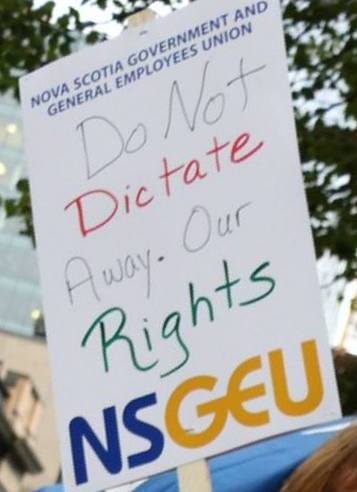 Another part that we are
actually trying to display here is that it unevens the playing field.
The employer has no pressure to bargain with anybody because we have
the wages in place in the bill. Usually wages is something that really
gets things moving in bargaining. An employer does not have the
incentive to bargain with anybody. They
are looking for people to accept concessions. Another part that we are
actually trying to display here is that it unevens the playing field.
The employer has no pressure to bargain with anybody because we have
the wages in place in the bill. Usually wages is something that really
gets things moving in bargaining. An employer does not have the
incentive to bargain with anybody. They
are looking for people to accept concessions.
I pleaded with the government to bring the bill in its
entirety to the Court of Appeal to ask questions. They told Nova
Scotians that they were taking the bill to the Court. We found out a
few days later from a reporter that they are not taking the whole bill,
they are only taking certain sections of it which they deem will be
declared
constitutional. So the government only put the pieces that they
believed are standing on a constitutional basis but they are not
bringing the pieces that are taking something out of our collective
agreement. The government was being untruthful to the public when they
said they were bringing the bill. We believe that taking a section
alone will only
create confusion as the court will only rule on something that is being
seen out of its context. The court needs to see the bill in its
entirety to realize that it is indeed unconstitutional. So we are
moving forward. We filed our intention and we are moving forward in
that route. I would say "Stay tuned" for any other actions that will
come from
this.
I would want to see them get rid of Bill 148
because they know it is unconstitutional. But if anything they must
keep their promise to Nova Scotians and bring the bill in its entirety
to the Court of Appeal. That is an expedited process. We would have an
answer for that probably in 6 months while our court challenge may
take 6 years. The process is different because the Court of Appeal
will look at it and they will give their opinion back to the
government. I want them to hold true to what they promised Nova
Scotians in the first place. Besides, if McNeil was to retire today he
would get $89,000. He has a transitional allowance and so does
every other
MLA but they are taking away the public service award for public
servants across this province.
WF: Do you want to say something in
conclusion?
JM: We are facing across this
country an austerity agenda that is a race to the bottom. We are being
told why should we have something when nobody else has it. What we are
saying is that everybody should have it, everybody should have a
pension and so on. That is the agenda we are up against.

Quebec
Paramedics on Strike

Striking paramedics contingent in 2017 Montreal May Day march.
While their collective agreements expired on March 31,
2015, the 6,000 paramedics in Quebec have now been on general strike
since March of this year. They are fighting for improvements to their
conditions of employment,
which are the conditions of the important services they provide. To
improve the service they deliver, the paramedics want to abolish the
on-call
schedules in the regions, where paramedics are on duty seven days in a
row for 24 hours a day followed by seven days off. Within this
demand, they seek a workload that corresponds to what can be done under
the current conditions given the ever more complex tasks they have to
perform and the reduced level of staffing. Their demands
include similar wage increases to those obtained in 2016 by other
public and para-public workers and improvements to the pension plans.
The Quebec government refuses to budge on any demands
given its own law that paramedics must provide full services during the
strike except administrative duties. The government withdrew from
direct negotiations with the paramedics in 2016, leaving the
situation in the hands of the employers' associations, which operate
with state
funds. The government did intervene negatively by imposing budget and
staffing cuts for this important work.[1]
Interviews
Benoît
Cowell, President of the Brotherhood of
Pre-Hospital Workers of Quebec
Benoît Cowell, President of the Brotherhood of
Pre-hospital Workers of Quebec (FTQ), which represents 1,000
paramedics told Workers' Forum that nothing has moved at the
bargaining tables.
"We're trying to get the discussions going with the
employers and the government," Benoît said. "The government says
that employers have the mandates they need in order to settle and the
employers are saying that their service contracts do not allow them to
settle. Employers have suffered cuts of $121 million in their
service contracts
so it is certain that private companies do not want to cut their
profits. They cut our conditions. We are putting pressure on the
Ministry of Health, on the Treasury Board and on the main members of
the Cabinet so that real negotiations take place. Nothing has been put
on the table since the spring by the employers and the government."
The Brotherhood of Pre-hospital Workers is also subject
to a temporary injunction, extended until October, making it illegal
for workers to demonstrate in front of the constituency office of
Health Minister Barrette, or anywhere on the property on which the
office is located. A court hearing will be held in October when the
Brotherhood will
plead for the injunction to be withdrawn.
Daniel Chouinard, President of the Quebec Federation
of Pre-Hospital Employees
Daniel Chouinard, whose union represents 1500
paramedics, recently spoke with Workers' Forum affirming their
intention to continue the strike struggle to improve working conditions
and the services they provide.
Daniel said, "The Ministry of Health and the
companies are currently in a legal dispute over the service contracts
that have been imposed on the companies and we hear that there is going
to be no new offer (to paramedics) until the dispute is resolved unless
the Corporation des services ambulanciers du Québec (CSAQ) and
the
Ministry reach an out-of-court settlement.
"We have stepped up our actions since the beginning of
August, notably by increasing our administrative pressure by not
providing the information that the employers need to bill the patients.
We are going to start a campaign soon to distribute pamphlets to the
people across Quebec to explain the conflict, to explain that we are
not only
fighting for our working conditions but also for the quality of
service."
Note
1. Employers of paramedics include Urgences
Santé, which is governmental, and many contracted
non-governmental agencies (private companies, not-for-profit
organizations and cooperatives) represented mainly by the Corporation
des services ambulanciers du Québec (CSAQ). The CSAQ has taken
legal action
against the Ministry of Health to challenge the imposition of service
contracts that include budget cuts, which has effectively stalled
negotiations with the paramedics.

Tentative Agreement for Montreal
Pre-Hospital Sector Workers
The Union of the pre-hospital sector of the Federation
of Health and Social Services-CSN (FSSS-CSN) announced a tentative
collective agreement on July 20 with Urgences-Santé. The
agreement includes a new defined benefit pension plan that the union
considers superior to the current pension plan. It also includes wage
increases
deemed satisfactory by the bargaining committee.
The tentative agreement can only go to members for
ratification if the other unions in the pre-hospital sector receive the
same pension plan, as the pension plan is a Quebec national decision
and arrangement. The agreement also includes various improvements in
conditions at the local Montreal level.
The FSSS-CSN representing approximately 3,600
workers in the pre-hospital sector is now seeking to replicate the
Montreal tentative agreement with respect to the pension plan and wages
with other pre-hospital employers throughout Quebec where it has
members. The union has also called upon other unions in the sector to
seek the
same tentative agreement.
Jean Gagnon, representative of the pre-hospital sector
of the FSSS-CSN told Workers' Forum, "We are asking employers
to agree to offer the same working conditions as those negotiated in
Montreal for the whole of Quebec as has always been the case with
regard to the common matters, namely the pension plan and wages."

Salaberry-de-Valleyfield
Adopt a Striker at CEZinc
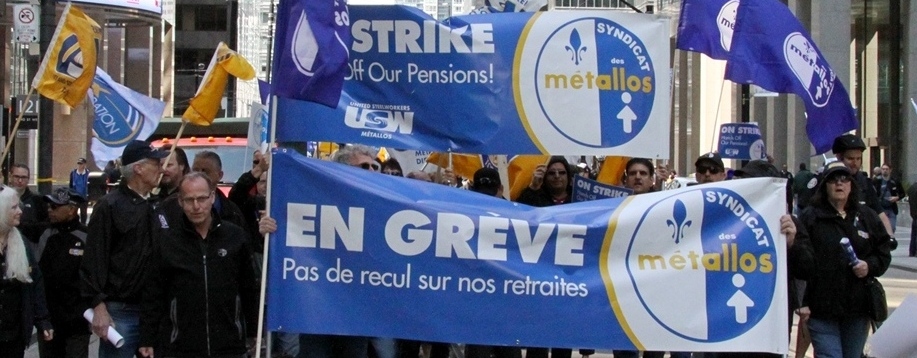
Striking CEZinc workers march outside Noranda Income Fund's
shareholders meeting
in
Toronto, April 28, 2017.
The Quebec section of the United Steelworkers (USW) has
launched an "Adopt a Striker" campaign to support CEZinc workers who
have been on strike since February 12. The Quebec Director of USW
Alain Croteau announced the campaign in Salaberry-de-Valleyfield on
July 28, during a solidarity action with the
strikers.
"Adopt a Striker" involves asking all USW locals across
Canada to make a recurring donation to a CEZinc striker at an amount
and frequency of a local's choice until the end of the strike. All USW
districts in Canada and locals are being mobilized to participate in
the effort.
"Of course, our strike relief continues to be
distributed," explained Alain. "But after six months of conflict,
solidarity rises a notch. By adding this campaign to what already
exists as strike relief, the employer must understand that support for
our workers will never cease to grow. And our CEZinc workers will know
once again that all the
steelworkers of Canada are at their side, always ready to support them
to the end."
 The 371 CEZinc workers
are engaged in battle against the company's demands for concessions.
CEZinc wants to introduce a system of gradually shifting wages to
contributions to the pension plan. The company also proposes to reduce
the value it puts into the pension plan by the same amount. This would
directly lower workers' wages
while increasing the corporate claim on the new value workers produce.
CEZinc also wants an increase in the age when workers can take early
retirement. Early retirement is a necessity for these plant workers
because they work in an environment full of highly toxic products. The 371 CEZinc workers
are engaged in battle against the company's demands for concessions.
CEZinc wants to introduce a system of gradually shifting wages to
contributions to the pension plan. The company also proposes to reduce
the value it puts into the pension plan by the same amount. This would
directly lower workers' wages
while increasing the corporate claim on the new value workers produce.
CEZinc also wants an increase in the age when workers can take early
retirement. Early retirement is a necessity for these plant workers
because they work in an environment full of highly toxic products.
Workers point out that the pension plan is more than
solvent at 114 per cent. They reject these attacks against their
pension regime that CEZinc workers have built through determined
struggle over the years and one that must remain in place for
themselves and future generations.
The Noranda Income Fund owns the CEZinc Refinery. The
Anglo-Swiss trading and mining empire called Glencore plc owns 25
per cent of the Noranda Income Fund and operates the
Salaberry-de-Valleyfield
plant. Glencore is the exclusive supplier of zinc concentrate to the
plant and the sole buyer of the products the workers produce. Glencore
plc
ranks tenth in the Fortune Global 500 list of the world's
largest companies.
The CEZinc striking steelworkers continue to be engaged
in actions to support the struggles of other workers who face similar
problems and demands for concessions. They traveled to Abitibi on
August 23, to meet a delegation of U.S. miners from the Lucky
Friday mine in Idaho owned by Hecla Mining. The U.S. miners have been
on
strike for 6 months on issues related to their health and safety.
They journeyed all the way from Idaho to meet the workers of the
Hecla-owned gold mine Casa Berardi in Abitibi-Témiscamingue.
The CEZinc workers are also waging an international
campaign against Glencore plc. In May, with the support of other
international unions, they intervened at the Glencore shareholders'
meeting in Switzerland to present their case. Previously, in late
April, with the support of Steelworkers in Hamilton and Toronto, they
intervened in Toronto
at the Noranda Income Fund's shareholders meeting to present the facts
of their strike and call upon shareholders to put pressure on the
owners for a settlement that is acceptable to the workers. They are now
preparing to go to Colombia on September 12, to support other
Glencore workers.
The Steelworkers' "Adopt a Striker" campaign
demonstrates their determination to continue the CEZinc strike with
increased vigour and determination to force the company to withdraw its
demand for anti-worker concessions.

CEZinc workers rally in Salaberry-de-Valleyfield, Quebec, March 29,
2017.

British Columbia
Support the Pacific Blue
Cross Workers!
"My Integrity Can't Be Bought!" --
Locked Out Pacific Blue Cross Worker
- Anne Jamieson -

The workers of Pacific Blue Cross (PBC), members of
Canadian Union of Public Employees (CUPE) Local 1816, have been
locked out since July 6. A picketer reports that a BC court issued
an injunction against union members on Friday, August 18. The
injunction prohibits them from congregating around cars bringing
scab replacement workers across the picket line.
Locked out workers report that the employers refuse to
negotiate a new collective agreement in good faith. During a session on
August 18, they refused to budge one iota from their anti-worker
stand of stealing retirement and other hard-won benefits from
current and retired CUPE members.
In a bizarre twist, on the same day the court ordered
picketers not to harass scabs, the BC Labour Relations Board told the
PBC administration to "cease and desist" its use of scab replacement
workers. The employers are flagrantly disobeying this instruction
assisted by the court. A picketer said, "They don't even bother to
sneak them (scabs)
in at 11:30 at night, or 2:00 in the morning. They do it in
full daylight, rubbing our noses in it. They have the full weight of
the courts, the police, the RCMP, and the Supreme Courts behind them,
while we have next to nothing," she said. "The Labour Relations Board
has no mechanism to enforce its rulings."
"Welcome to capitalism!" another picketer said.
"Yes, we know this, but it takes actual experience to
really know this!" said another. "Well, we won't quit. My integrity
can't be bought!"
Picketers expressed disappointment with certain former
union members who are now on the board of directors of PBC, including a
former CUPE member. Picketers said those individuals have shown no
support to the members of CUPE Local 1816, but instead have been
helping to spread the anti-worker propaganda of PBC CEO Jan Grude.
Those former union members on the board have chosen to
become part of the ruling elite acting to undermine the resistance of
workers in defence of their rights. They are pushing the rotten
ideology of the powers that be onto the working class. The picketers
have militantly rejected any association with those who betray their
fellow workers
and class. Picketers have publicly exposed the cowardice and treachery
of those on the board.
In contrast to the crass betrayal of some, the
picketers while walking the sidewalks around the Pacific Blue Cross
building constantly hear the approving honks of drivers in cars and
trucks passing by on the busy thoroughfares of Canada Way and Gilmore
who express their firm support for the locked out workers. Every week,
new signs
adorn the
CUPE 1816 tent headquarters from members of other unions and
associations who have been walking the picket line in solidarity such
as those from ILWU, ATU, VDLC, and the Douglas College Faculty
Association.

Members of the BCGEU join picketers at Pacific Blue Cross on July 12,
2017.
The Struggle of the Pacific Blue Cross Workers Is
the
Fight of All Workers
The New Westminster Labour Council organized a
spirited solidarity picket to support the more than 600 workers of
Pacific Blue Cross who have been locked out by their employer since
July 6. Members of the Canadian Union of Public Employees (CUPE),
Local 1816, have been without a contract since last autumn.
Their efforts to negotiate with the employers for a new contract have
been met with intransigence, demands for concessions and punitive
measures when workers decided to take action to defend their just stand
that retiree benefits not be touched.
Members of other unions participated in the solidarity
picket on July 20, bringing banners and supplies of food for the
locked out workers. Among them were ILWU, BCGEU, CUPE, CUPW, ITF, HEU,
BCNU, HSA, and other unions as well as representatives of the Vancouver
& District Labour Council.
The day the company announced the lockout, Beth Miller,
President of CUPE Local 1816 said, "The Union will not have its
strategy dictated by the employer. If the employer chooses to lock out
our members, we will picket the employer's places of business." Indeed,
the workers have organized daily pickets round the clock at the
headquarters of PBC at Canada Way and Gilmore Way in Burnaby.
CUPE BC President Paul Faoro said in solidarity at the
rally, "It is absolutely shameful that this employer is not only trying
to roll back retiree benefits for these workers but is essentially
punishing them for trying to get a fair deal. On top of denying them
sick leave and no longer collecting their union dues, locking them out
just seems
beyond the pale. This is obviously a form of retaliation for the
Union's job action."
At the solidarity picket July 20, the numerous
unions brought banners and messages of support for the striking and
locked out workers and their resistance against the imperialist agenda
of the ruling elite. One large banner by the International Transport
Federation (ITF) said, "No union busting in the ports!" The transport
workers are
clear that their demands for justice in the ports and transport
corridors are similar to the resistance of the Pacific Blue Cross
workers to the imperialist agenda of austerity and attacks on workers'
rights.
The solidarity event expressed the determination of all
to organize to resist the current wave of attacks on workers' rights
and society. Cars and trucks passing the event honked noisily in
support, as happens during the daily PBC pickets. The PBC workers and
their allies are determined to see this struggle through to a just
conclusion.

The Use of "Essential Services" and "Consultants"
to Break Strikes
Provisions in the previous Pacific Blue Cross (PBC)
collective agreement, allow some workers to work in essential services
during a strike action. PBC employers are using those provisions as a
strike-breaking tool to weaken the just struggle of PBC workers.
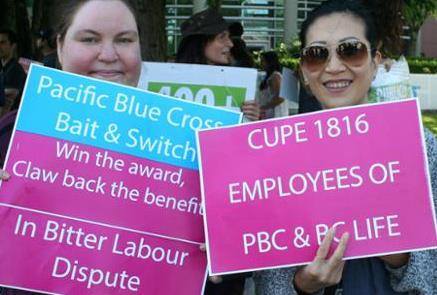 Originally allowed in
contract language for emergency services like ambulance paramedics and
nurses, for example, the concept of essential service has been
distorted to mean any work the employer deems essential for the company
to continue operating during a strike. The rationale in this case is
that cheques to some benefit recipients
covered by PBC insurance plans must not be delayed. The alleged
employer concern for some benefit recipients rings hollow indeed when
the company cares nothing for the well-being of its workers and their
families, or that of its retirees. Originally allowed in
contract language for emergency services like ambulance paramedics and
nurses, for example, the concept of essential service has been
distorted to mean any work the employer deems essential for the company
to continue operating during a strike. The rationale in this case is
that cheques to some benefit recipients
covered by PBC insurance plans must not be delayed. The alleged
employer concern for some benefit recipients rings hollow indeed when
the company cares nothing for the well-being of its workers and their
families, or that of its retirees.
In addition to forcing some workers to keep working as
essential services, the company is bringing in scabs to do work and
calling them consultants. This shows the company's utter contempt for
the people who work and those who have worked in the past and are now
retired but under the threat of losing benefits.
Those now in control of the company seem to think they
can violate with impunity any aspect of the modus vivendi that
had previously been worked out in collective agreements with workers.
This form of imperialist intransigence and denial of workers' rights
has come up against a just wall of working class resistance!
The Intransigence of Blue Cross Directors and
Management
Without a renewed contract for almost an
entire year, members of CUPE Local 1816 voted 95 per cent in
favour of strike action. It had become clear that the employers were
not interested in negotiating in good faith. Despite the best efforts
of the negotiating team of the local, the employers kept repackaging
the same
unreasonable demands to slash benefits for union members in retirement.
In an effort to achieve equilibrium within a collective
agreement agreeable to themselves, union members resorted to several
tactics including work to rule and rotating strike action in different
departments. The company retaliated by trying to make life difficult
for the workers. This included an announcement that flex time was no
longer
allowed. This arrangement permits a working parent to work 7 hours
within a 12-hour time frame to facilitate care of children and
other exigencies.
Pacific Blue Cross escalated the attack on workers with
the lockout on July 6. The company continues to bring in scab
consultants to do work in addition to management personnel doing
workers' work and forcing workers deemed essential to work as well.
The workers are determined to deprive the company of
its demand for concessions. Stand with the just struggle of the Pacific
Blue Cross workers!

Defending the Benefits of Pacific Blue Cross
Retirees Is Defending the Rights of All
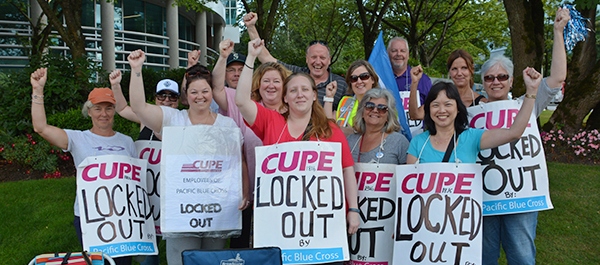
The struggle of the workers at Pacific Blue Cross to
defend their rights is all the more commendable in that they did not
give in to the employer's demand to roll back retirees' benefits.
Monopolies often start taking apart collective agreements piecemeal,
starting with retirees' benefits as a first step because they appear as
an easy target
without recourse to withholding their capacity to work.
The imperialist view separates workers' productive
years
when working with their years in retirement. The anti-social line does
not see workers' lives as a single whole from birth to passing away.
Once retired, the imperialists argue, workers hold no further value for
the monopolies and should be cast adrift from fellow members of the
working
class still working. It is the classic tactic of divide and rule,
except
it does not work if the working class refuses to be divided.
The struggle of the Pacific Blue Cross workers flies in
the face of the imperialists who think they can act with impunity in
attacking the rights of workers. The resistance of the Pacific Blue
Cross workers is significant in terms of defending the unity and rights
of all working people in the immediate sense and for the future, the
struggle signals
a desire and need to organize for a new direction for the economy and
society where the imperialists are deprived of their power to divide
and rule and control the lives of working people.
Defend the Dignity of All Workers Both
Working and Retired!
Support the
Just Struggle of the Pacific Blue Cross Workers, Local 1816!

Blue Cross/Blue Shield Restructuring in the U.S.:
A Hint of Things to Come?
As Pacific Blue Cross (PBC) employers were demanding
concessions from the union negotiating team, the PBC CEO Jan Grude was
reporting that the company's financial health "has never been better."
The new PBC CEO comes from the U.S. giving rise to a view that the
model the CEO is pushing on the company and its employees is
based on the Blue Cross/Blue Shield model in the U.S.
The U.S. version of health insurance manages services
similar to Medicare in Canada. Blue Cross/Blue Shield was officially
non-profit until 1994, when it changed its rules to allow its
licensees to be for-profit corporations. Since then, public trading of
stock ownership in the company and massive profits have been reported.
The Health
Care Service Corporation, the parent company of Blue Cross/Blue Shield
in some states, reports corporate profit nearly doubled to $1.09
billion in 2010, followed by four successive years of
billion-dollar profits. These private corporate profits in the health
care insurance sector come at the expense of the collective agreements,
working
conditions, and retiree benefits of the workers who provide the
service. At Pacific Blue Cross in Canada, workers and retirees face the
same imperialist anti-social agenda of the rich against workers and
retirees.

PREVIOUS
ISSUES | HOME
Website: www.cpcml.ca
Email: office@cpcml.ca
|

